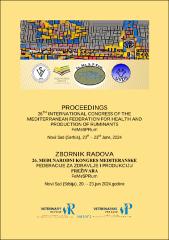| dc.description.abstract | In many scientific papers, the term biosecurity measures (BSMs) are defined as the implementation of segregation, sanitation or management procedures specifically designed to reduce the likelihood of the introduction, establishment, survival or spread of a potential pathogen into, within or from a farm or geographical area. The main BSMs (general external and internal BSMs related to newly introduced animals, farm workers, family members, visitors and service providers, vehicles, tools and equipment, location of farms, water and feed, control programs, management practices, handling of raw materials, work procedures, training, plans and records), based on literature data, guides, instructions, recommendation codes and checklists, are presented in the paper. In addition to the BSMs mentioned, the importance of segregation, cleaning and disinfection is emphasized. The most important and effective part of biosecurity is to keep infected animals and contaminated material away from non-infected animals. Cleaning and disinfecting barns, vehicles and equipment, especially boots and clothing, is a very effective way to minimize the transmission of disease to or between animals. It is very important to implement BSMs as a long-standing and successful practice on farms to maintain animal health. These measures should be included in a comprehensive biosecurity plan, which is tailored to farms characteristics and needs that must be fully implemented. A biosecurity plan and the design and implementation of biosecurity programs should address how farmers handle animals, vehicles and human access to the farm, as well as animal health and work procedures. Key BSMs should be followed on an ongoing basis and, working with veterinarians, farmers themselves can play an important role in keeping animals and production as healthy as possible. It is important to regularly assess the implementation of BSMs using appropriate questionnaires, which can highlight deficiencies that should be addressed immediately. | en_US |

